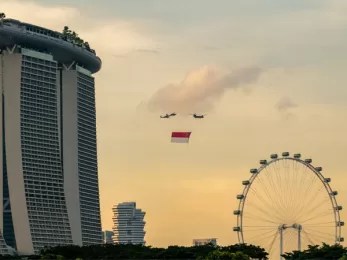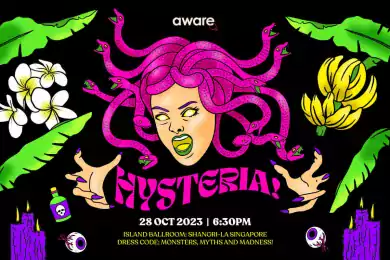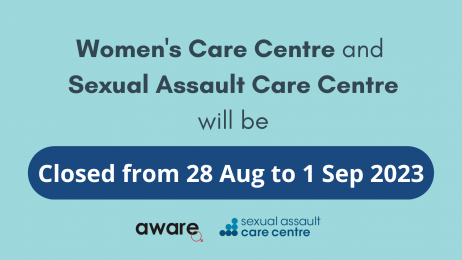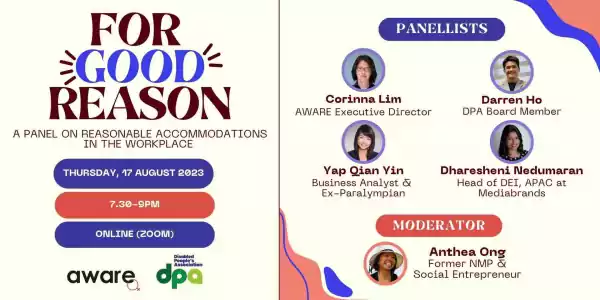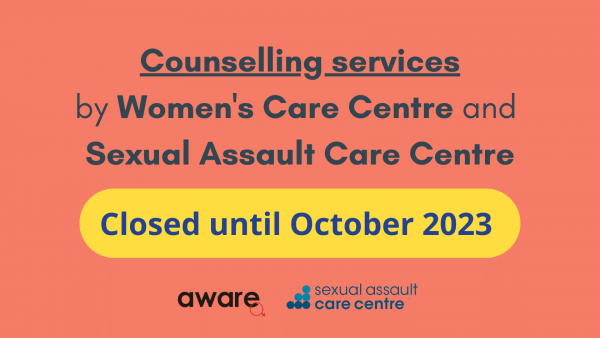
This op-ed was originally published in The Straits Times on 13 July 2023.
New mother Diana (not her real name) was suffering from depression, had trouble sleeping and eating, and was crying all the time, after her husband became coercive and controlling following the birth of their child.
If she angered him for whatever reason, he would not let her touch their child, not even to shower him. Sometimes he would scream at her in public or in front of other family members.
Desperate to get away from her husband, Diana left to stay with her mother, but that only served to put more distance between her and the child, whom she was not allowed to see.
We thought of Diana, and the many other women who called the Association of Women for Action and Research’s (Aware) Women’s Helpline with similar experiences of abuse, when the Women’s Charter (Family Violence and Other Matters) (Amendment) Bill was passed on July 4.
The Bill updates its existing definition of family violence to make clear that this includes physical, sexual and emotional or psychological abuse.
It signals a landmark shift in how the Government conceptualises and responds to family violence – one that we hope heralds cultural and societal growth in this arena.
The need for the change
Family violence is any abusive behaviour that occurs within the family setting.
This can take various forms – physical, sexual, emotional, psychological, financial and more – and can include behaviour that intimidates, terrorises, manipulates, humiliates, injures, threatens or curtails the victim.
Like all types of violence, it is centred on an urge to exert power and control over another person – in this case, someone in the perpetrator’s family, typically in a position of vulnerability and powerlessness.
Singapore has for decades had legislation prohibiting family violence, but the scope of this legislation did not capture the full breadth of such abuse, allowing cases to slip through the cracks.
The Women’s Charter previously defined family violence as wilfully or knowingly causing hurt or putting a victim in fear of hurt (“hurt” referring specifically to “bodily pain, disease or infirmity”), confining or restraining a victim against her will, or continually harassing a victim with the intention of causing anguish.
Beyond the vague concept of “anguish”, and the heavy emphasis on physical injury or confinement – which might have contributed to the misconception that only physical violence warrants concern – one inadequacy of this definition was its focus on perpetrator intention.
International understanding of abuse has moved past using intent as a determinant. Harm is harm, whether or not one is “wilfully or knowingly” causing it.
We applaud the new Act for rejecting the grounding of family violence in the abuser’s wilful actions or knowledge, and the requirement to establish intention for inflicting abuse.
Moving away from attempts to divine what a perpetrator was thinking at any given time, and focusing on the objective impact of their actions, is in line with trauma-informed and survivor-centric legislative approaches around the world.
Another step forward is the introduction of three clearer categories of abuse: physical abuse, sexual abuse, and emotional or psychological abuse.
The legislation also acknowledges that family violence can take the form of not just single, discrete incidents of violence, but a pattern such as described in cases of coercive control.
New spotlight on coercive control
In Parliament, Minister of State for Home Affairs, and Social and Family Development Sun Xueling, referring to controlling behaviours, noted situations in which perpetrators might “constantly call their spouses to check on their whereabouts, and isolate them from their friends or family, including disallowing them to leave the house”, at the risk of threats.
“These egregious forms of controlling behaviour – which fall within the definition of what some other jurisdictions call coercive control – can cause distress or mental harm to a survivor,” noted Ms Sun, “and would be considered emotional or psychological abuse under the new Bill.”
While the new Act falls short of overtly naming coercive control as a category of family violence, as Aware had suggested, we cheer the official entry of this form of abuse into the national lexicon.
Coercive control comprises a pattern of behaviour ranging from where the abuser threatens, humiliates, intimidates, manipulates and/or assaults the victim, to controlling, which can include social isolation, surveillance and monitoring, dictating movements, setting unreasonable criteria, and making financial and career decisions on the victim’s behalf.
While these may not be immediately recognisable as violence – particularly under the previous, more limited Women’s Charter definition – taken together, they deprive a victim of independence, autonomy and resistance.
Individuals experiencing coercive control often struggle to identify that they are victims of such abuse, sometimes only recognising they have to “walk on eggshells” around their spouse or family member.
Worse, coercive control is sometimes interwoven with seemingly loving behaviour, sometimes termed “love-bombing”; perpetrators might cast their abusive behaviour as care or need to cultivate confusion and dependency. This can have traumatic effects, eroding a victim’s sense of self.
More jurisdictions around the world have been seeking to legislate against coercive control.
Given this, Aware has tried to drive more public education around the issue locally, for example, by publishing a comic series in 2022 in collaboration with Ms Charis Loke based on the experiences of some coercive control survivors we knew.
These comics garnered waves of positive feedback, including comments from women who finally had a means to put their experiences into words. (“Thank u (sic) so much for this series,” one wrote, “as someone still healing from an abusive relationship.”)
We are also conducting qualitative research into what coercive control looks like in the Singapore context.
There is plenty more work to be done on the framework and relationship dynamics that underpin coercive control.
Research in other jurisdictions has shown that criminalising coercive control without adequate awareness-raising efforts may even backfire on survivors, if those supporting them do not fully understand the issue.
Training relevant personnel, from those working on helplines, and social workers, to police officers and judges, is a critical step in the light of the updated law.
For now, we celebrate this recent development. Before, victims of coercive control in Singapore were hard-pressed to seek justice under the law. More help is now available to them.
The question of financial abuse
Another type of family violence mentioned in Parliament was financial abuse, though Ms Sun said it was “an emerging issue (that) requires further study”.
While one illustration under the new emotional or psychological abuse definition does contain an example of financial abuse (threats to stop a monthly allowance) – and a person may seek protection against financial abuse if they can prove it caused them intimidation, harassment or distress – the Women’s Charter, for that reason, leaves financial abuse out as a category of family violence.
Some might dismiss financial abuse as merely the improper use of another person’s income or assets. Yet, financial abuse has implications similar to coercive control in how it erodes a victim’s personal liberties.
Belle (not her real name), a migrant spouse, used to give her Singaporean parents-in-law a monthly sum as they had offered to manage payments towards the house for which she and her husband had applied.
But they used her money for personal expenses. Their financial requests escalated to an amount higher than Belle’s monthly salary. When she refused to hand over the amount, they kicked her out of the house.
Apart from actions like incurring debts in the victim’s name or coercing them to hand over property or control over finances to the abuser, financial abuse can also include preventing or restricting the victim’s ability to work, or even to get an education.
Several jurisdictions such as the United Kingdom, Australia, New Zealand, Canada and many US states protect against financial or economic abuse in their legislation.
We hope legislation here will one day cover this as well.
Where do we go now?
The features of the amended Women’s Charter, plus other freshly installed levers (such as stay-away orders and no-contact orders, protectors and enforcement officers, and new options for mandatory treatment orders) may provide much-needed protection to victims of family violence.
Yet, the full potential of the legislation will be realised only through a more concerted trauma-informed approach – one that remembers victims suffer loss of power and control at the hands of their abusers, and that the law should help return agency to them.
This trauma-informed lens must be instilled in all practitioners in the family justice system through comprehensive training in the nuances of violence, including coercive control.
More than that, to truly address family violence at its roots, we need to go beyond the law.
Considering the gendered nature of family violence – with men making up the vast majority of perpetrators, and women and girls the majority of victims – we must not overlook the importance of “upstream” measures, such as education on gender dynamics and stereotypes, as a means to develop a more progressive culture, and a less violent way of relating to one another.
Sugidha Nithi is AWARE’s director of Advocacy, Research and Communications.
